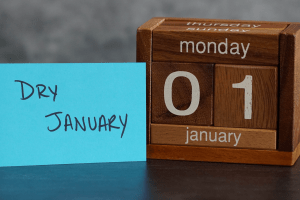
National Institute on Alcohol Abuse and Alcoholism (NIAAA)
Embracing Community and Culture to Prevent Underage Drinking
This piece originally appeared on November 4, 2021, on the National Institute on Minority Health and Health Disparities’ NIMHD Insights. In recognition of Native American Heritage Month, Dr. Koob discussed NIAAA-supported research demonstrating the importance of community-based interventions in preventing underage drinking among American Indian and Alaska Native youth.

Pictured are two youths who are members of the Yup’ik community in Alaska, which is collaborating with an NIAAA grantee on an alcohol-use prevention program. Photo by Georgianna Ningeulook, Scammon Bay, Alaska.
Supporting research to better understand and address alcohol-related health disparities and improve the health of underserved populations is one of the highest priorities of the National Institute on Alcohol Abuse and Alcoholism (NIAAA).
Among our efforts is NIAAA’s long-term investment in preventing underage drinking. Early initiation of alcohol consumption and heavy drinking increases the risk of alcohol use disorder (AUD) and related consequences over a person’s lifetime, and alcohol intervention efforts started at a young age can positively influence a young person’s path in life. Research indicates that prevention efforts involving the community and/or informed by the community’s cultural beliefs hold promise for preventing and reducing underage drinking.
In a decades-long project supported by NIAAA, Stacy Rasmus, Ph.D., at the University of Alaska, Fairbanks, in collaboration with the Yup’ik Native Alaskan community, is examining how tapping into a community’s culture can provide a cornerstone for youth substance misuse and suicide prevention efforts. Together, they developed the Qungasvik (Tools for Life)” Toolbox” intervention, which uses community, cultural, and historical connectedness to build protective factors against suicide and alcohol misuse at individual, family, and community levels. Research findings have shown that Qungasvik is effective in reducing co-occurring youth alcohol misuse and suicide risk, and ultimately, AUD and death by suicide.
Other NIAAA-supported studies have demonstrated the importance of community mobilization in preventing underage drinking among American Indian/Alaska Native (AI/AN) youth. Kelli Komro, Ph.D., at Emory University, and colleagues worked with the Cherokee Nation to implement and test the effectiveness of Communities Mobilizing for Change on Alcohol, a community-organizing intervention designed to reduce youth alcohol access. The community-level intervention was implemented and evaluated alongside CONNECT, a school-based alcohol screening and brief intervention. The researchers found that the prevention strategies either alone or in combination were effective in reducing alcohol use among American Indian (AI) and other youth living in rural communities.
In another study, Roland Moore, Ph.D., at the Pacific Institute for Research and Evaluation, and colleagues evaluated a combined community- and individual-level intervention on underage drinking among AI youth living on rural California reservations. The community interventions included restricting alcohol sales to minors as well as activities to raise awareness of the risks of underage drinking and to mobilize community support for the interventions. The individual interventions consisted of either culturally tailored brief motivational interviewing or education about the consequences of drinking and dangers of binge drinking, assisted by a therapist. Among youth who drink, researchers found reductions in the frequency of drinking and heavy drinking among AI youth exposed to the interventions relative to non-AI/AN students from their region and rural AI/AN students outside of the intervention area.
These studies demonstrate that community-based interventions, alone or in combination with individual-level interventions, can play an important role in preventing underage drinking among AI/AN youth. It is essential that that we continue to develop, implement, and sustain culturally informed, effective, evidence-based interventions to prevent alcohol and other substance misuse, as well as the many related consequences from suicide to AUD, among underserved youth across the nation.
References
- Rasmus SM, Trickett E, Charles B, John S, Allen J. The qasgiq model as an indigenous intervention: Using the cultural logic of contexts to build protective factors for Alaska Native suicide and alcohol misuse prevention.Cultur Divers Ethnic Minor Psychol. 2019 Jan;25(1):44-54. doi: 10.1037/cdp0000243.
- National Institute on Alcohol Abuse and Alcoholism. NIAAA to Host Webinar on Interventions in American Indian and Alaska Native Communities. In: NIAAA Spectrum Vol. 12, Issue 3, Fall 2020 Accessed May 2021.
- Komro KA, Livingston MD, Wagenaar AC, Kominsky TK, Pettigrew DW, Garrett BA; Cherokee Nation Prevention Trial Team. Multilevel Prevention Trial of Alcohol Use Among American Indian and White High School Students in the Cherokee Nation. Am J Public Health. 2017 Mar;107(3):453-459. doi: 10.2105/AJPH.2016.303603. Epub 2017 Jan 19.
- Moore RS, Gilder DA, Grube JW, Lee JP, Geisler JA, Friese B, Calac DJ, Finan LJ, Ehlers CL. Prevention of Underage Drinking on California Indian Reservations Using Individual- and Community-Level Approaches. Am J Public Health. 2018 Aug;108(8):1035-1041. Epub 2018 Jun 21.
- National Institute on Alcohol Abuse and Alcoholism Strategic Plan 2017-2021. Accessed May 2021.
Need Help for an Alcohol Problem?
If you’re having an emergency, call 911. If you are having suicidal thoughts, call 911, go to the nearest emergency room or call the toll-free, 24-hour National Suicide Prevention Lifeline at 1-800-273-TALK (8255) to help you through this difficult time.
The NIAAA Alcohol Treatment Navigator can help you recognize and find high quality treatment for alcohol use disorder. If you drink excessively, seek medical help to plan a safe recovery as sudden abstinence can be life threatening. NIAAA’s Rethinking Drinking can help you assess your drinking habits and provides information to help you cut back or stop drinking.







